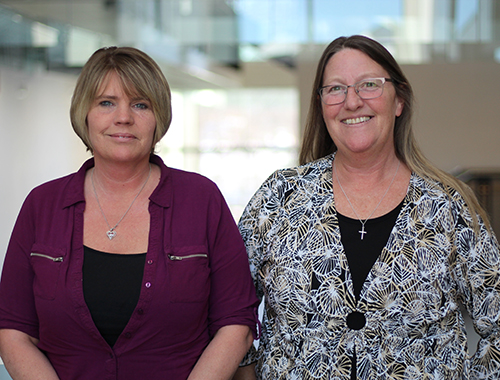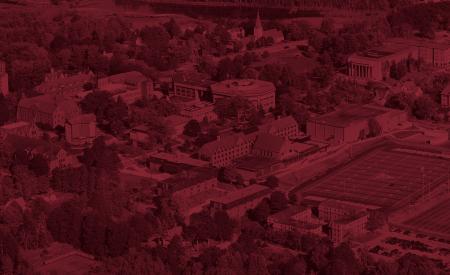Meet Denise and Isobel — Mount Allison’s helpdesk analysts
 If you have ever had a technology-related crisis on the Mount Allison campus, chances are you have been helped along by Denise Johnson or Isobel Snowdon — even if you didn’t know it.
If you have ever had a technology-related crisis on the Mount Allison campus, chances are you have been helped along by Denise Johnson or Isobel Snowdon — even if you didn’t know it.
Johnson and Snowdon run Mount Allison’s Computing Services Helpdesk, which fields requests for assistance with a wide variety of technology and computing-related issues.
Snowdon has worked at Mount Allison for 15 years. Her first role was in Housing, where she was responsible for room assignments.
She has been a helpdesk analyst for the past eight years.
“Because of my work in Housing, I brought a lot of extra information with me when I came here to the Helpdesk,” she says.
Prior to Mount Allison she worked as a trainer with UPS and Exxon Mobile, helping to develop and provide customer service training to employees, work that lines up perfectly with her current role.
Johnson also has a customer service background, working with AOL and Moneris doing troubleshooting. She returned to school in her 30s to study accounting and was hired as an administrative assistant in Computing Services, a role she held for six years before moving to the Helpdesk 10 months ago.
“I like working with people and helping people,” she says. “And you’re continuously learning and continuously changing.”
Their most common requests are for password resets, account creations, and troubleshooting programs like Microsoft Word and Office 365.
“If someone is calling about a specific issue, we are the front line,” Snowdon says. “We know who in Computing Services can handle the issue if we can’t. And it is always best to go to the Helpdesk first because we know who is in and who it out and if it is urgent, we know who can do what needs to be done.”
Although their main focus is campus technology, Snowdon and Johnson also frequently help students with their personal software or devices.
“We do our best to try to resolve their issue before sending them elsewhere. And if we can’t help them, we can tell them who to go to,” Snowdon says. “We have held students’ hands when they have lost their paper and they are crying. I think it is the mother in both of us.”
They have also helped students navigate software like PowerPoint, have done troubleshooting for wifi-related issues or using and installing e-mail or applications on mobile phones, and helped set house executives up with the right equipment to host a coffee house or movie night in residence. They also assist residence students in setting up DeviceNet, a new wireless network on campus that allows students to connect wireless devices like gaming systems and printers.
Johnson says another common thing they deal with is compromised accounts.
“Anytime someone comes to us with a compromised account, we take the time to work with them and tell them what to watch for and good practices and guidelines to follow so it doesn’t happen again,” Johnson says.
Computing Services also has published cybersecurity tips on its website to help people avoid common pitfalls that can make their accounts vulnerable. That includes not clicking on links or opening attachments from unknown or suspicious sources, creating a strong password, and only installing software from official sites. Computing Services will also never send a request for a password or other personal information via e-mail. Messages requesting this type of information are phishing attempts and should be deleted.
“When in doubt about an e-mail, forward it the Helpdesk and ask or give us a call,” Johnson says. “And NEVER share your password.”
Students can find out more about Computing Services and the services and equipment they provide at mta.ca/csd. They can also contact Isobel and Denise at the Helpdesk at helpdesk@mta.ca or 364-2473.




